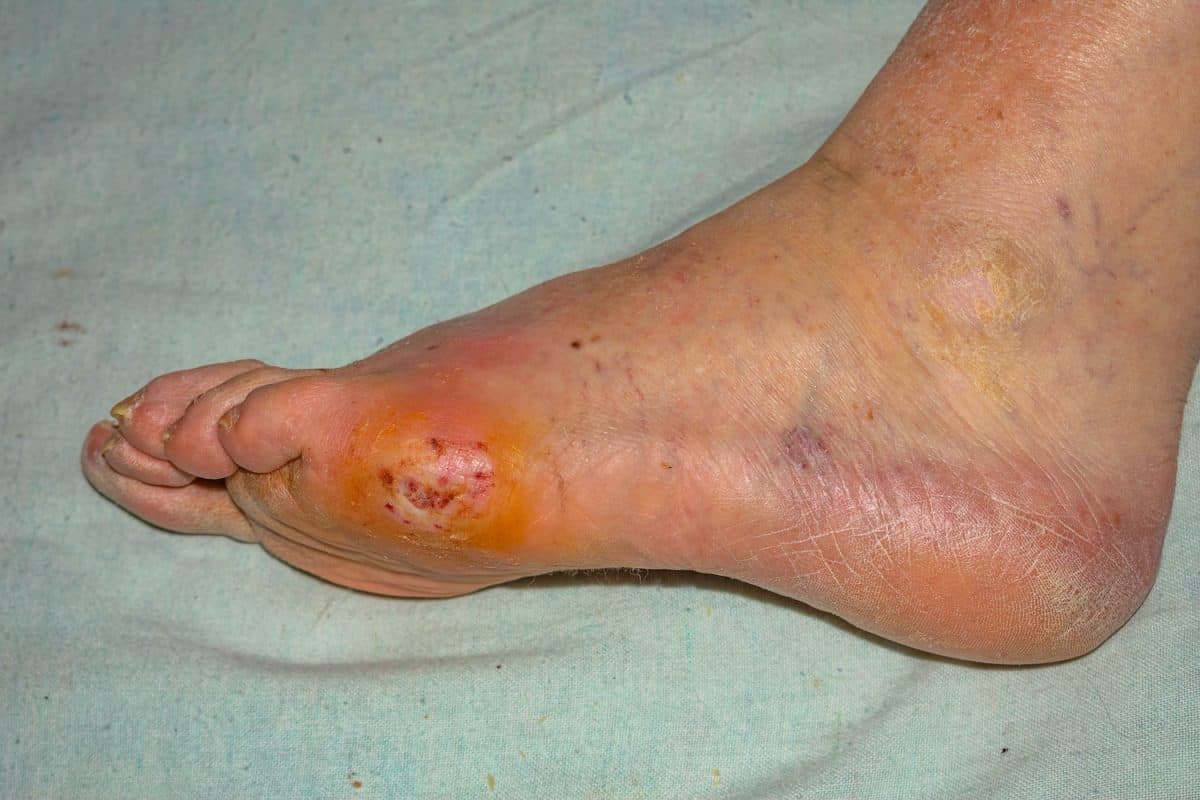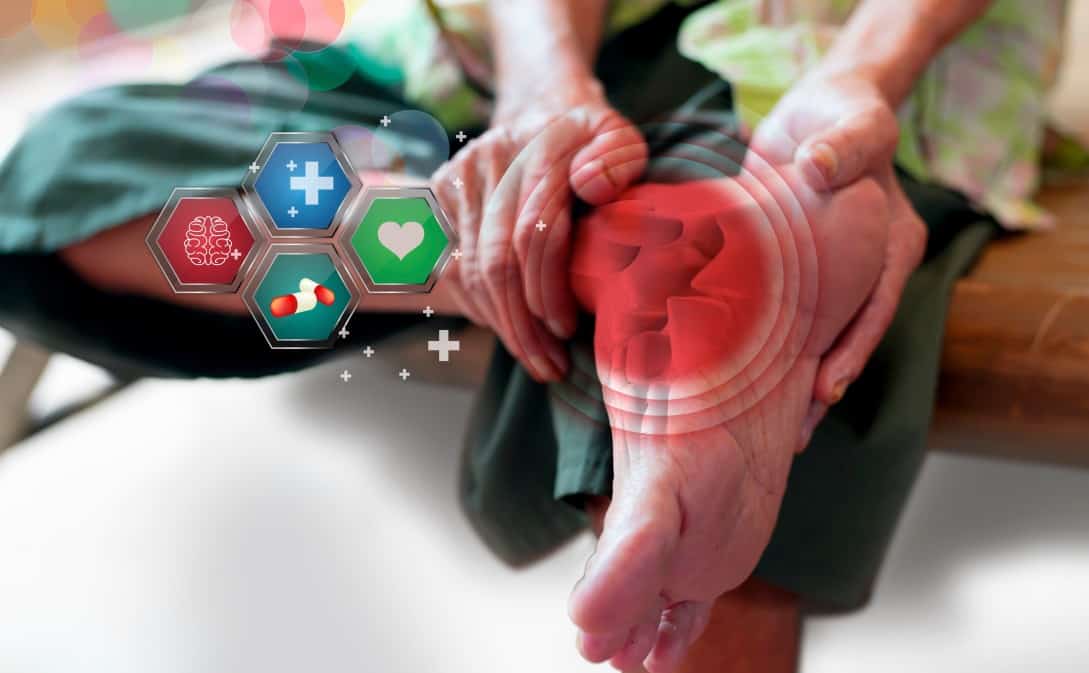As we slowly and gracefully navigate through our Golden Years, life continues to present unpleasant surprise twists and turns with declining health. So one day, you feel pretty good, and the next day you don’t.
Take Ms. Ruthie, a 64-year-old Hairstylist with type 2 diabetes. Her once vibrant and successful 35-year career in hair care resulted in forced retirement due to symptoms related to Neuropathy. She started experiencing short periods of weakness and pain with walking and standing because of swollen legs and feet. Later, she began feeling dizzy and weak. She ignored these symptoms by attributing them to her age, diabetes, and work-related stress.

As the pain and weakness continued, she found it difficult to perform simple daily tasks around the salon. These unwelcome and unexpected problems were affecting her mobility more and more. To alleviate her discomfort, Ms. Ruthie decided to hire a part-time Hairstylist, purchase a walking cane for balance, and a pair of quality comfortable shoes. This was a short-term solution that worked well until the numbness in her hands flared up months later. She simply described her hands as feeling as if they were inside a bag of sand. This prompted her to make a doctor’s appointment, and she was immediately referred to a Neurologist for further examination. Ms. Ruthie was diagnosed with Peripheral Neuropathy.


What Is Neuropathy?
Pronounced as noo–rop–uh-thee, Neuropathy is defined as nerve damage and nerve pain.
Neuropathy Symptoms
Common symptoms include a frequent feeling of “pins and needles” in the leg, feet, and hands. Persistent tingling of the extremities with stabbing pains often shooting down to the feet. Bare feet feel covered up. Insomnia occurs due to constant pain. There’s excessive sweating or inability to sweat. Muscle weakness, dizziness, loss of balance, and lack of coordination are possible. You may experience sensitivity to the slightest touch as well as intolerance to heat and cold.

Neuropathy Types Defined
There are four known types of Neuropathy: Peripheral, Autonomic, Focal, and Proximal.
Peripheral Neuropathy is nerve damage, dysfunction, and pain to parts of your nervous system like your peripheral nerves. It can develop from a brain injury, stroke, alcohol abuse, or other medical conditions like diabetes, a leading cause of chronic pain. Symptoms can worsen and tend to flare up due to triggers related to inflammation, infection, swelling, and physical pressure on the nerve.
Autonomic Neuropathy affects the involuntary nerves that control the organs of your body. These nerves control heart rate, heart contraction strength, blood pressure, urination, intestine movements like diarrhea and constipation.
Focal Neuropathy is common. It includes conditions like carpal tunnel syndrome caused by compression of hand and wrist nerves. Compression can occur due to pressure from prolonged positions or from overusing a limb in a manner that causes inflammation.
Proximal Neuropathy is less common than other neuropathy types. It affects nerves of the limbs such as the thighs, upper arm, or shoulders. It is common to occur along with Peripheral Neuropathy.

Copper Infused Compression Gloves
Relieve the pain from swelling in your wrists, hands and fingers with these copper infused compression gloves.
Save 20% sitewide with code SENIORAFFAIR
Causes of Neuropathy
A number of factors can lead to a neuropathy diagnosis. Diabetes is the main cause where you experience pain, burning, and loss of sensation in the feet and hands. For example, deficiency in vitamins B1, B6, B12, E, and Niacin can harm nerve function. Excessive alcohol consumption causes low levels of Thiamine which is vital for proper nerve function. Nerve damage can occur because of injuries or intense physical activities that compress the nerves. Normal oxygen levels due to vascular disorders that reduce blood flow to the extremities, genetic disorders, and autoimmune diseases can also cause Neuropathy. Other diseases such as kidney and liver disorders, tumors, myeloma, and lymphoma are also known triggers.
Save 15% on these FitVille Neuropathy shoes with patented PropelCore Soles.
Treatment for Neuropathy
Good news! There is an abundance of remedies available to relieve and treat neuropathy symptoms. However, before indulging in any of the following activities, discuss them with a Neurologist or other medical professional specializing in geriatric medicine as there are long-term benefits, side effects, and risks involved.
- Physical therapy and regular exercise to strengthen muscles.
- Comfortable wide-width footwear with an extra-depth design, padded and thick cushioned lining, wide toe box, orthotics insole, non-binding stretch uppers, and seamless interior.
- Intravenous Immunoglobulin (IVIG) – This therapy is an intravenous procedure performed in a hospital or in the privacy of your home. A medical professional administers anti-inflammatory medication directly into your bloodstream. Headaches are a side effect relieved with any over-the-counter pain reliever like Tylenol Extra Strength.
- Electrical nerve stimulation for damaged nerves and pain relief. Low voltage electrical currents are administered on and around the affected nerves.
- Gabapentin, Cayenne Pepper (includes Capsaicin), or Apple Cider Vinegar for shooting burning nerve pain
- Pain-numbing agents like topical creams, lotions, or ointments.
- Warm Baths and Vicks Vapor Rub® on legs and feet to soothe pain and distress.
- Non-steroidal anti-inflammatory medication for pain reduction, swelling, and inflammation.
- Dietary supplements such as Acetyl-L-Carnitine. Acetyl-L-carnitine, Alpha-Lipoic Acid, Vitamin B, Curcumin, Fish Oil, N-Acetyl Cysteine, and prescribed anti-depressants.
- Natural ingredients with pure concentrated hemp extract known as CBD or Cannabidiol. For example, Elixinol CBD Gummies could help relieve agonizing joint discomfort and general muscle aches, soreness, sleep disorders, anxiety, and dozens of other ailments. There’s no THC and it heals without you feeling high.
- For blood sugar control, Aloe Vera, Flax Seeds, Fenugreek, Turmeric, and Indian Blackberry.
- Avoid food containing gluten, salt, sugar, artificial sweeteners, alcohol, refined grains, and saturated fats.

Full Spectrum CBD Vegan Gummies
Vegan CBD Oil Full Spectrum Gummies taste so good, you’ll never miss your CBD for the day! These tasty gummies are made with citrus pectin, so they have nutritional fiber to enhance bioavailability and are vegan-friendly. No matter what you need, our Vegan Gummies deliver for you!
Save 30% sitewide with code Senior30
Covid and Neuropathy
A new long Covid study shows that the virus can cause lots of different long-lasting effects, these symptoms include nerve damage, heart problems, tingling sensations, depression, and brain fog. The damage to the nerves that connect the brain and spinal cord was more likely 90 days after infection.
Conclusion
Neuropathy, in any form, can be very difficult and stressful to deal with. It is the damage of any nerve in the body causing dysfunction. The type of nerves and pattern involved depends on the cause. Peripheral Neuropathy, a common type, is usually brought on by diabetes, alcohol abuse, chemotherapy, and several other potential reasons. It can significantly diminish your quality of life and the ability to be active. Do not panic. Pay close attention to the warning signs. Immediately seek medical advice to choose the best treatments and solutions to fit your needs. Unfortunately, there is no known permanent cure for Neuropathy; however, as previously noted, there are preventative measures to stop it from worsening.

Fortunately, Ms. Ruthie does not struggle with her neuropathic pain and swelling as much as before. Instead, she has followed her doctor’s advice and performs several activities to combat it and control her blood sugar. The monthly IVIG treatments, low-fat diet, and physical exercise have changed her quality of life. Ms. Ruthie enjoys traveling with her family again, planting vegetables in her garden, and participating in an aerobics class.
She finds it easier to resume providing hair care services to select clients from time to time.
If you have Neuropathy or its symptoms, I wish you blessings of overall excellent health and long-term relief.
All the best!

Author
Retired at age 57, living in suburban Chicago, Tracy has started a new chapter as a writer of novels and the president of an active book club.
Sources
https://my.clevelandclinic.org/health/diseases/14737-neuropathy
https://www.diabetes.org/diabetes/neuropathy
https://journals.lww.com/pain/Abstract/9900/Post_acute_sensory_neurological_sequelae_in.32.aspx


